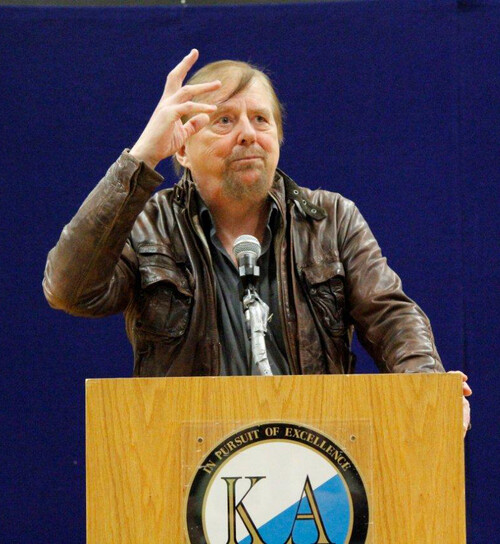
The First and Second World Wars, separated by a scant 20 years, changed the way humanity views war, giving motivation to avoiding a repeat of war on similar scale, says military historian and author Gwynne Dyer.
Dyer, whose column is published in the Lethbridge Herald and dozens of other newspapers, told a gathering of high school students at Kate Andrews High School in Coaldale Monday, March 17.
Prior to the First World War, wars were relatively small affairs, “armies were small and weapons weren’t very good,” he said. “War was not seen as the problem. Losing a war was seen as the problem.”
The First World War, 1914-18, was the first industrialized war, introducing machine gun weaponry capable of inflicting heavy damage to large numbers of troops. Dyer recalled interviewing a veteran who described soldiers walking toward machine gun fire with their forearms held up in front of their faces “like they were walking into snow, but they were walking into lead.”
“We didn’t understand what the war was going to do in terms of killing people,” he said.
By 1917, with the casualty numbers mounting, young Canadian men stopped volunteering for service, forcing the federal government to introduce conscription, a move that resulted in the real threat of civil war in Canada.
The war ended in November 1918, sparing high numbers of conscripts from being sent to battle, sparing Canada an uprising. While previous wars had been fought and settled over strips of territory, the Great War concluded with an unprecedented peace agreement.
“It was a peace in which we made Germany then take the blame for the entire war,” Dyer said. “And we made them pay for it.”
The response from Germany was predictable, he said.
“Hitler was a fluke, but the rematch was a certainty. It came not in 50 years (which had been the norm between major wars). It came in 20.”
The Second World War upped the ante with the introduction of nuclear weapons.
“The First World War scared us quite badly,” he said. “The Second World War terrified us to death.”
The result was creation of the United Nations, which made war illegal and gave the major powers an opportunity to back away from war without losing face.
“One hundred years ago, everyone saw war as part of the landscape,” Dyer said. “Nobody saw it as a problem. . . Now everybody sees war as a problem. This is a change of the human mindset.”
Dyer’s lecture was attended by not only students at Kate Andrews, but by students from other Palliser Regional Schools, including County Central High in Vulcan, Noble Central in Nobleford and Coalhurst High School.

